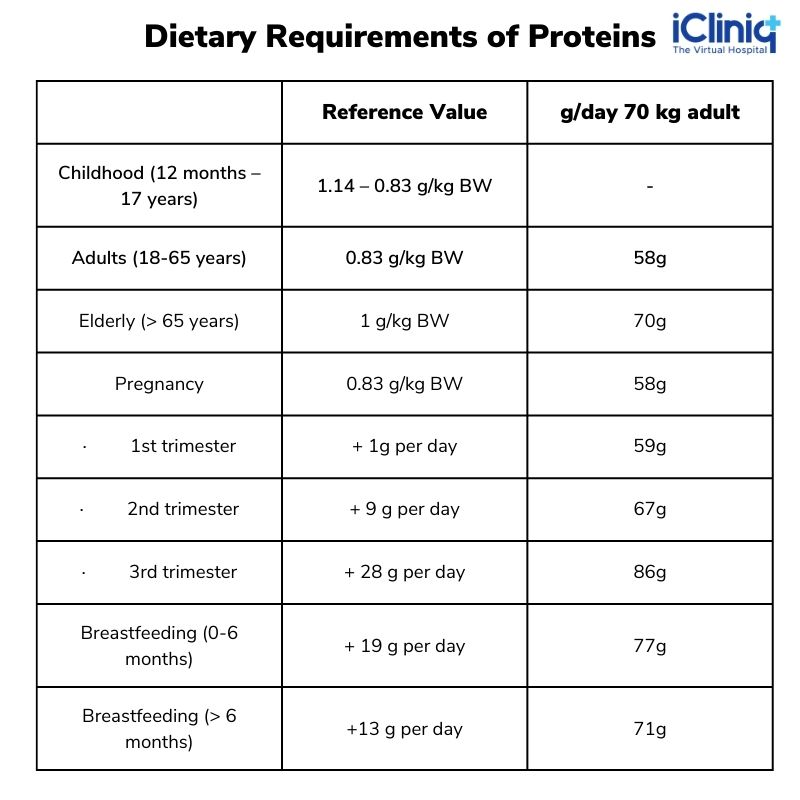What Are Proteins?
Proteins are the power horses that steer the essential metabolic functions of the body thus helping in the proper functioning of the body. Proteins are integral constituents of every organ and tissue in our body like muscles, hair, and nails. They are complex macromolecules that are also referred to as building blocks of our body as they play a vital role in regulating the functions of various cells, organs, and tissues of the body.
Proteins are made up of amino acids. To maintain a continuous supply of amino acids to the body, dietary intake of proteins is essential. It is estimated that adults require 0.83 g of protein per kg of their body weight per day. This amount can be derived from any food sources that are rich in protein.
What Are Proteins Made up Of?
Proteins are made up of chemical compounds known as amino acids. These amino acids, when linked and structured in a specific pattern, form a particular protein. Roughly 300 or more amino acids are required to make a protein. The number and sequencing of amino acids are unique to every protein. These amino acids are classified broadly into essential and non-essential amino acids. Essential amino acids need to be supplemented through the diet whereas non-essential amino acids can be produced by the body. They are described in detail below:
Essential Amino Acids:
-
Histidine
-
Isoleucine
-
Leucine
-
Lysine
-
Methionine
-
Phenylalanine
-
Threonine
-
Tryptophan
-
Valine
Non-essential Amino Acids:
-
Alanine
-
Arginine
-
Asparagine
-
Aspartate
-
Cysteine
-
Glutamate
-
Glutamine
-
Glycine
-
Proline
-
Serine
-
Taurine
-
Tyrosine
What Are the Dietary Requirements for Protein?
According to the European Food Safety Authority (EFSA), an average adult requires 0.83 g of protein per kg of body weight per day. The requirements vary depending on the developmental stage, gender, physical activity, and age. The protein requirements are considerably higher in children, pregnant women, and lactating mothers. Athletes, sports players, and bodybuilders also require a higher quantity of protein.

What Are the Dietary Sources of Protein?
Proteins can be obtained from either plant or animal sources. Nuts, milk, egg, lentils, soy, seafood, beans, and peas are rich sources of proteins. Animal-based sources are a wholesome source of complete proteins whereas plant sources tend to lack a few.

What Are the Functions of Protein in Our Body?
Proteins are a crucial element of all vital body tissues and organs. They help build muscle and other body tissues and thus are responsible to maintain the structure of the body. Proteins have various crucial functions in the body as they are key in producing hormones, enzymes, and other essential biological substances that are important to perform the metabolic activities. The functions of proteins are described in detail below:
1. To Function as Enzymes:
Enzymes are biochemical substances that are responsible for certain chemical reactions in the body. Various chemical reactions are happening in every cell of the body. Few proteins act as enzymes that function as the primary catalyst for these reactions. Every enzyme is specific and individualized for a particular chemical reaction. Breaking down food, converting the nutrients in them to energy, and storing them for future use all are enzymatic reactions that are mediated by proteins.
2. For Hormone Synthesis:
Hormones are chemical messengers in the body that carry out various important functions. Proteins are the key element in hormone synthesis. A few examples of hormones made from proteins are insulin, melatonin, thyroid hormone, and glucagon.
3. Maintain Fluid and Electrolyte Balance:
Proteins are essential to maintain the fluid-electrolyte balance in the body. Too much and too little water in the body can be consequential. Constant high-concentration circulation of protein in the blood helps attract water thereby maintaining the water concentration.
4. Maintaining Acid-Base Balance:
Proteins are important to maintain the pH in the blood. The pH of the blood should be maintained between 7.35 and 7.45 which is slightly alkaline. Too acidic or too alkaline blood pH could result in systemic illness. Proteins act as buffers and thus can maintain the pH of the blood.
5. Nutrient Transport:
Certain specialized proteins also known as transport proteins help to move nutrients and other molecules in and out of the cell.
6. Immune System:
The body’s immune system is the primary defense mechanism against foreign substances. The immune system produces antibodies which are nothing but specialized proteins that can attack the foreign body or the pathogen and prevent any illness.
7. Wound healing and tissue regeneration:
Proteins are essential in all aspects of wound healing from generating a blood clot to arrest bleeding to the regeneration of tissue. Proteins are an integral part of the cell cycle where cell repair and cell death happen periodically. The amino acids present in the cell are recycled into proteins.
8. As an Energy Source:
Though proteins contribute little energy, they are a vital source of energy in individuals whose diet lacks carbohydrates and fats.
Conclusion:
Proteins are vital components required for sustaining life. It plays a crucial role in various metabolic functions of the body that are required for growth and development. Various food sources act as a reservoir of protein. Diet poor in protein could result in deficiency leading to various systemic illnesses. Thus choosing protein-rich food will help support a healthy and sustainable diet and also help meet the daily protein requirement.









